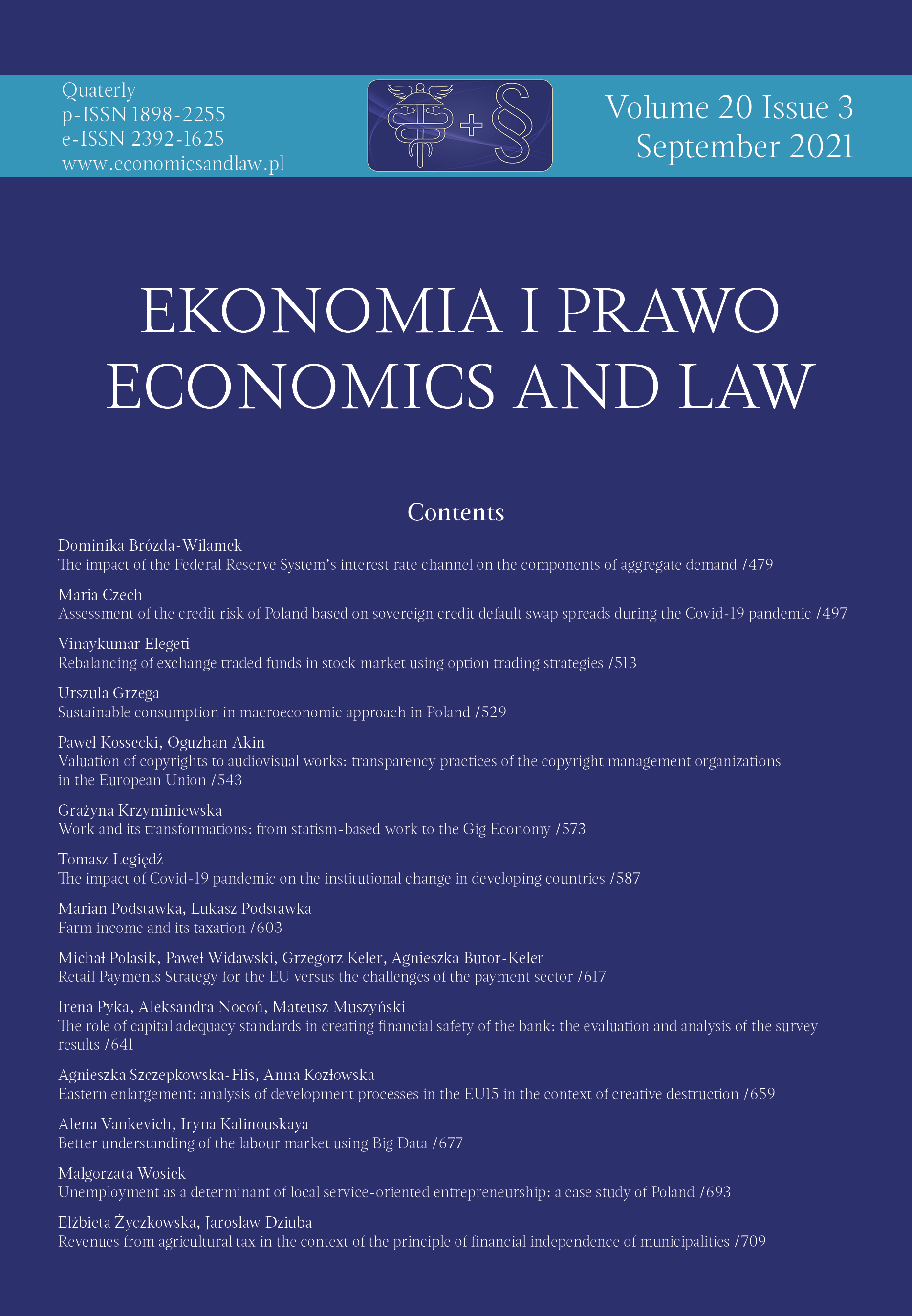Better understanding of the labour market using Big Data
DOI:
https://doi.org/10.12775/EiP.2021.040Keywords
labour market, skills, competencies, Big Data, open-job portalsAbstract
Motivation: As the result of digitalisation of the economy, the number of Internet users is increasing, which leads to an increase in the number of vacancies posted on online platforms and services. The description of vacancies includes information about skills and competencies, which is the source of additional data for the labour market analysis. This information cannot be received through the analysis of statistical and administrative data. Therefore, it is important: — to learn how to evaluate new information sources, and use the data they generate; — to develop tools that people and organizations will use for finding an employee or a vacant post. The study focuses on the analysis and forecast of labour demand in the context of skills and competencies, which significantly enriches and adds to the information about the labour market and facilitates effective decision-making.
Aim: The main goals of this article are the following: (1) identification of the methodological approaches in the labour market analyses using Big Data; (2) assessment of the labour demand and labour supply in the context of skills and competencies listed in the vacancy description posted on job portals; and (3) determination of the matches (mismatches) between skills and competencies in order to help the companies and individuals get better employment and education. Empirical data used in the research were collected from the description of job vacancies (16 401 vacancies) and CVs (227 215 CVs) from the most popular open job portals in Belarus through the scraping approach and classified according to the ESCO and ISCO codes. Quantitative analysis by the means of artificial intelligence was used in the research.
Results: The study results revealed that the information about the volume and structure of skills and competencies obtained by scraping data from vacancy descriptions and Cvs, which are posted on online portals, allows for more precise diagnostics of labour demand and supply and overcoming of bilateral information asymmetry in the labour market. Based on the analysis, the parameters of scarcity and excess in competencies for individual occupations in the labour market are determined (the level of the correlation ratio between applicants’ competencies and those requested by employers in the context of occupations (four digits according to the ISCO classification) is less 0.8; the deviation of the ranks of competencies listed in CVs and vacancy descriptions according to the ESCO groups of skills/competencies and a sign of revealed deviations). The methodology is developed to set areas for necessary knowledge acquisition (by the analysis of competencies listed in CVs and vacancy descriptions at the 3rd and 4th digit level of ISCED classification) and skills (by the analysis of competencies at the 2nd digit level in ESCO groups). The paper illustrates limitations in using Big Data as an empirical database and explains the measures to eliminate those limitations.
References
Bejger, S., & Elster, S. (2020). Artificial Intelligence in economic decision making: how to assure a trust? Ekonomia i prawo. Economics and Law, 19(3), 411–434. https://doi.org/10.12775/EiP.2020.028.
Borjas, G.J. (2015). Labor economics (7th ed.). McGraw–Hill Education.
CEDEFOP. (2019a). Online job vacancies and skills analysis: a CEDEFOP pan-European approach. https://doi.org/10.2801/097022.
CEDEFOP. (2019b). The online job vacancy market in the EU: driving forces and emerging trends. CEDEFOP Research Paper, 72, 1–96. http://data.europa.eu/doi/10.2801/16675.
Horton, J.J., & Tambe, P. (2015). Labor economists get their microscope: big data and labor market analysis. Big Data, 3(3), 130–137. https://doi.org/10.1089/big.2015.0017.
ILO. (2020). The feasibility of using big data in anticipating and matching skills needs. Retrieved 04.11.2021 from https://www.ilo.org/wcmsp5/groups/public/---ed_emp/---emp_ent/documents/publication/wcms_759330.pdf.
Kureková, L.M., Beblavý, M., & Thum-Thysen, A. (2015). Using online vacancies and web surveys to analyse the labour market: a methodological inquiry. IZA Journal of Labor Economics, 4, 18. https://doi.org/10.1186/s40172-015-0034-4.
Makovskaya, N. (2020). Modern features of the labor market functioning in belarus. Monograph. A.A. Kuleshov Mogilev State University. Retrieved 04.11.2021 from https://libr.msu.by/bitstream/123456789/12909/1/3345n.pdf.
Mezzanzanica, M., & Mercorio, F. (2019). Big data for labour market information: an introductory guide. Retrieved 04.11.2021 from https://www.etf.europa.eu/sites/default/files/2019-06/Big%20data%20for%20LMI.pdf.
Oyer, P., & Schaefer, S. (2011). Personnel economics: hiring and incentives. In D. Card D., & Ashenfelter, O. (Eds.), Handbook of labor economics, 4B, 1769–1823. https://doi.org/10.1016/S0169-7218(11)02418-X.
Roshchin, S.Y., & Solntsev, S.A. (2017). How companies search employees: empirical evidence from Russian companies. Russian Management Journal, 15(2), 173–192. https://doi.org/10.21638/11701/spbu18.2017.203.
UK Commission for Employment and Skills. (2014). Information to local intelligence: guidance on local labour market assessments. Retrieved 04.11.2021 from https://assets.publishing.service.gov.uk/government/uploads/system/uploads/attachment_data/file/346923/Local_LMI_Guidance_Aug14_FINAL_with_covers_v3.pdf.
Vankevich, A., & Kalinouskaya, I. (2020). Artificial Intelligence technologies in human resource management. Belarusian Economic Journal, 2(91), 38–51. https://doi.org/10.46782/1818-4510-2020-2-38-51.
Vankevich, A., & Castel-Branco, E. (2017). Information-analytical system of the labour market and forecasting of demand for personnel: content and directions of formation in the Republic of Belarus. Belarusian Economic Journal, 2(79), 73–92.
Vasiliev, D.S., Roshin, S.Y., Solntsev, S.A. (2016). Evolution of job search technologies in the labor market in the internet age. National Research University Higher School of Economics. Retrieved 04.11.2021 from https://wp.hse.ru/data/2016/05/11/1129129931/WP15_2016_02____.pdf.
World Economic Forum. (2018). Towards a reskilling revolution: a future of jobs for all. Retrieved 04.11.2021 from https://www3.weforum.org/docs/WEF_FOW_Reskilling_Revolution.pdf.
Downloads
Published
How to Cite
Issue
Section
License
Copyright (c) 2022 Alena Vankevich, Iryna Kalinouskaya

This work is licensed under a Creative Commons Attribution-NoDerivatives 4.0 International License.
Stats
Number of views and downloads: 1806
Number of citations: 0
